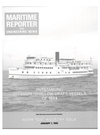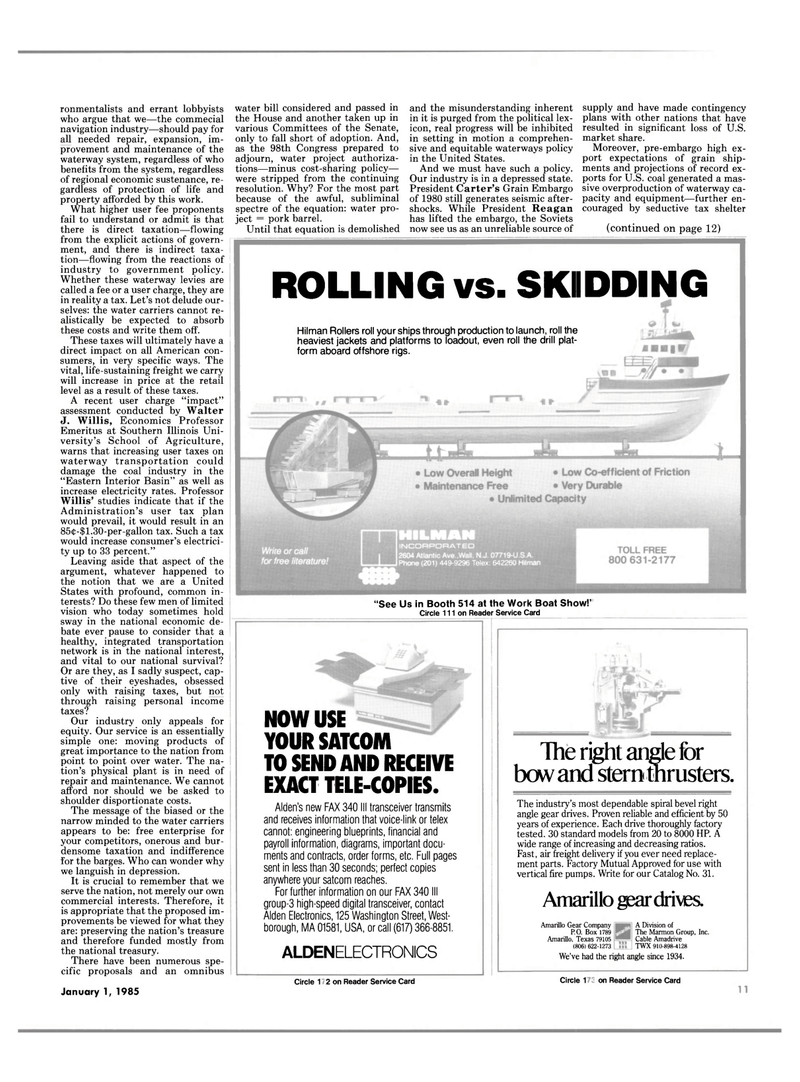
Page 9: of Maritime Reporter Magazine (January 1985)
Read this page in Pdf, Flash or Html5 edition of January 1985 Maritime Reporter Magazine
ronmentalists and errant lobbyists who argue that we—the commecial navigation industry—should pay for all needed repair, expansion, im- provement and maintenance of the waterway system, regardless of who benefits from the system, regardless of regional economic sustenance, re- gardless of protection of life and property afforded by this work.
What higher user fee proponents fail to understand or admit is that there is direct taxation—flowing from the explicit actions of govern- ment, and there is indirect taxa- tion—flowing from the reactions of industry to government policy.
Whether these waterway levies are called a fee or a user charge, they are in reality a tax. Let's not delude our- selves: the water carriers cannot re- alistically be expected to absorb these costs and write them off.
These taxes will ultimately have a direct impact on all American con- sumers, in very specific ways. The vital, life-sustaining freight we carry will increase in price at the retail level as a result of these taxes.
A recent user charge "impact" assessment conducted by Walter
J. Willis, Economics Professor
Emeritus at Southern Illinois Uni- versity's School of Agriculture, warns that increasing user taxes on waterway transportation could damage the coal industry in the "Eastern Interior Basin" as well as increase electricity rates. Professor
Willis' studies indicate that if the
Administration's user tax plan
would prevail, it would result in an
85 Leaving aside that aspect of the
argument, whatever happened to
the notion that we are a United
States with profound, common in-
terests? Do these few men of limited
vision who today sometimes hold
sway in the national economic de-
bate ever pause to consider that a
healthy, integrated transportation
network is in the national interest,
and vital to our national survival?
Or are they, as I sadly suspect, cap-
tive of their eyeshades, obsessed
only with raising taxes, but not
through raising personal income
taxes?
Our industry only appeals for
equity. Our service is an essentially
simple one: moving products of
great importance to the nation from
point to point over water. The na-
tion's physical plant is in need of
repair and maintenance. We cannot
afford nor should we be asked to
shoulder disportionate costs.
The message of the biased or the
narrow minded to the water carriers
appears to be: free enterprise for
your competitors, onerous and bur-
densome taxation and indifference
for the barges. Who can wonder why
we languish in depression.
It is crucial to remember that we
serve the nation, not merely our own
commercial interests. Therefore, it
is appropriate that the proposed im-
provements be viewed for what they
are: preserving the nation's treasure
and therefore funded mostly from
the national treasury.
There have been numerous spe-
cific proposals and an omnibus
January 1, 1985
water bill considered and passed in
the House and another taken up in
various Committees of the Senate,
only to fall short of adoption. And,
as the 98th Congress prepared to
adjourn, water project authoriza-
tions—minus cost-sharing policy—
were stripped from the continuing
resolution. Why? For the most part
because of the awful, subliminal
spectre of the equation: water pro-
ject = pork barrel.
Until that equation is demolished
and the misunderstanding inherent
in it is purged from the political lex-
icon, real progress will be inhibited
in setting in motion a comprehen-
sive and equitable waterways policy
in the United States.
And we must have such a policy.
Our industry is in a depressed state.
President Carter's Grain Embargo
of 1980 still generates seismic after-
shocks. While President Reagan
has lifted the embargo, the Soviets
now see us as an unreliable source of
supply and have made contingency
plans with other nations that have
resulted in significant loss of U.S.
market share.
Moreover, pre-embargo high ex-
port expectations of grain ship-
ments and projections of record ex-
ports for U.S. coal generated a mas-
sive overproduction of waterway ca-
pacity and equipment—further en-
couraged by seductive tax shelter
(continued on page 12)
ROLLING vs. SKIIDDING
Hilman Rollers roll your ships through production to launch, roll the
heaviest jackets and platforms to loadout, even roll the drill plat-
form aboard offshore rigs.
"See Us in Booth 514 at the Work Boat Show!'
Circle 111 on Reader Service Card
NOW USE
YOUR SATCOM
TO SEND AND RECEIVE
EXACT TELE-COPIES.
Alden's new FAX 340 III transceiver transmits
and receives information that voice-link or telex
cannot: engineering blueprints, financial and
payroll information, diagrams, important docu-
ments and contracts, order forms, etc. Full pages
sent in less than 30 seconds; perfect copies
anywhere your satcom reaches.
For further information on our FAX 340 III
group-3 high-speed digital transceiver, contact
Alden Electronics, 125 Washington Street, West-
borough, MA 01581, USA, or call (617) 366-8851.
ALDEN ELECTRONICS
The right angle for
bow and stern thrusters.
The industry's most dependable spiral bevel right
angle gear drives. Proven reliable and efficient by 50
years of experience. Each drive thoroughly factory
tested. 30 standard models from 20 to 8000 HP. A
wide range of increasing and decreasing ratios.
Fast, air freight delivery if you ever need replace-
ment parts. Factory Mutual Approved for use with
vertical fire pumps. Write for our Catalog No. 31.
Amarillo gear drives.
Amarillo Gear Company
P.O. Box 1789
Amarillo, Texas 79105
(806) 622-1273
A Division of
The Marmon Group, Inc.
Cable Amadrive
TWX 910-898-4128
We've had the right angle since 1934.
Circle 192 on Reader Service Card Circle 201 on Reader Service Card 11

 8
8

 10
10
